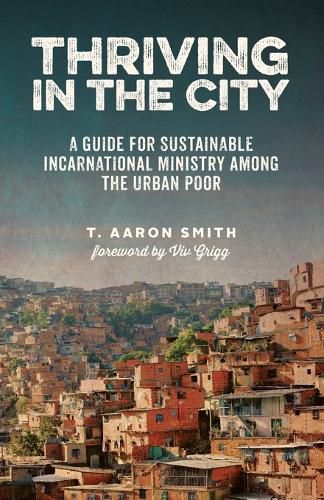Readings Newsletter
Become a Readings Member to make your shopping experience even easier.
Sign in or sign up for free!
You’re not far away from qualifying for FREE standard shipping within Australia
You’ve qualified for FREE standard shipping within Australia
The cart is loading…






This title is printed to order. This book may have been self-published. If so, we cannot guarantee the quality of the content. In the main most books will have gone through the editing process however some may not. We therefore suggest that you be aware of this before ordering this book. If in doubt check either the author or publisher’s details as we are unable to accept any returns unless they are faulty. Please contact us if you have any questions.
What does it mean to live in an urban poor slum or inner city for twenty years? What does it take to raise a family there, and to find God’s love and peace in the most challenging neighborhoods?
In Thriving in the City: A Guide for Sustaining Incarnational Ministry among the Urban Poor, T. Aaron Smith helps new leaders to answer that question for themselves. Smith integrates the voices of 100 incarnational leaders who have made the choice to live, to work, and to raise families within urban poor communities. He adds twelve years’ worth of stories from his own ministry in Manila, Philippines to create a thoughtful, narrative-based reflection guide to different decisions and strategies that could help many leaders to stay longer and minister more powerfully in their uniquely challenging contexts.
Smith leads the Servant Partners team in Manila, Philippines, where he serves as a founding leader of Botocan Bible Christian Fellowship. He also directs the Transformational Urban Leadership program at Asian Theological Seminary in Manila, and is the lead instructor in Servant Partners’ Global Urban Training School, Foundations. He earned a Masters of Divinity from Asian Theological Seminary, and a Doctor of Ministry from Bakke Graduate University in Seattle, Washington. Aaron and his wife, Ema, and their sons, Zach and Ezra, continue to live and serve among the urban poor.
$9.00 standard shipping within Australia
FREE standard shipping within Australia for orders over $100.00
Express & International shipping calculated at checkout
This title is printed to order. This book may have been self-published. If so, we cannot guarantee the quality of the content. In the main most books will have gone through the editing process however some may not. We therefore suggest that you be aware of this before ordering this book. If in doubt check either the author or publisher’s details as we are unable to accept any returns unless they are faulty. Please contact us if you have any questions.
What does it mean to live in an urban poor slum or inner city for twenty years? What does it take to raise a family there, and to find God’s love and peace in the most challenging neighborhoods?
In Thriving in the City: A Guide for Sustaining Incarnational Ministry among the Urban Poor, T. Aaron Smith helps new leaders to answer that question for themselves. Smith integrates the voices of 100 incarnational leaders who have made the choice to live, to work, and to raise families within urban poor communities. He adds twelve years’ worth of stories from his own ministry in Manila, Philippines to create a thoughtful, narrative-based reflection guide to different decisions and strategies that could help many leaders to stay longer and minister more powerfully in their uniquely challenging contexts.
Smith leads the Servant Partners team in Manila, Philippines, where he serves as a founding leader of Botocan Bible Christian Fellowship. He also directs the Transformational Urban Leadership program at Asian Theological Seminary in Manila, and is the lead instructor in Servant Partners’ Global Urban Training School, Foundations. He earned a Masters of Divinity from Asian Theological Seminary, and a Doctor of Ministry from Bakke Graduate University in Seattle, Washington. Aaron and his wife, Ema, and their sons, Zach and Ezra, continue to live and serve among the urban poor.